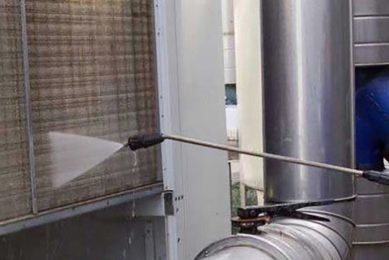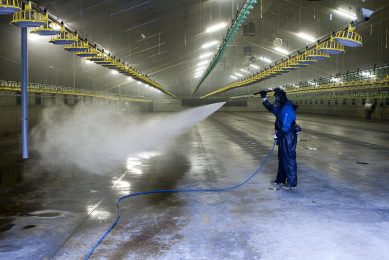Greek broiler farm tests power of disinfectants

Every broiler farm is different and that is exactly why it makes sense to continue testing a commercial disinfectant thoroughly under real life conditions before applying it on the farm. Recent trials in Greece have proven the performance benefits.
Results from efficacy testing under lab conditions do discriminate between good and bad disinfectants and therefore we are all looking forward to harmonised European testing standards. However, to conclude on which product is amongst the best for a given farm, on-the-spot farm testing is essential. A field trial done on a Greek broiler farm underlines this.
Broiler house trial set-up
The farm, not far away from Athens, made 2 poultry houses available. The 2 adjacent empty buildings of approximately equal size and construction were cleaned in the same way. A disinfection by spraying was performed using a 2% solution of a peroxygen compound in one house and a 1% solution of Halamid in the other. Swabs were taken by an external lab and checked for Enterobacteria, TBC and Salmonella.
The results showed that the 1% Halamid solution performed better than the 2% solution of the peroxygen formulation. Particularly on Enterobacteria a striking difference was seen and TBC values for the ‘Halamid’ building were better as well.
Cleaning is a critical point
Commenting on the results, Mr Orestis Zisidis, Technical Director of Food&Farm Solutions, distributor for Halamid in Greece said, “The laboratory results, confirmed that the difference was real. The other product, well-known in the Greek market, had high numbers in Enterobacteria and TBC. I have to admit that the cleaning of the 2 buildings could have been done better, but this is the reality in most cases and under these conditions, Halamid performs better than the peroxygen compound.”
Indeed not only the choice of disinfectant but also cleaning is often a critical point. Halamid, because its killing effect is better dosed, remains active in the presence of dirt for a longer time and this allows for a more effective killing of micro-organisms. This milder though powerful mode of action also explains how this solution is less corrosive, is less dangerous for the aquatic environment and that it has a lower risk profile for the operator.




